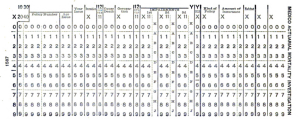Presented By: Science, Technology and Society
STS Speaker Series. A History of 'Impairment'
Mara Mills, New York University

“Impairment” is a key term in Anglophone disability studies and medical discourse, referring to physical difference, limitation, or injury. When disability scholars and activists critique the definition of impairment, they generally place the concept in the genealogy of medicalization and inappropriate pathologization. Yet as this talk will show, the history of impairment is as bureaucratic and actuarial as it is medical.
Popularized by the American life insurance industry in the early twentieth century, "impairment" indicates rating as well as diagnosis—the attachment of value, risk, or financial loss to particular traits. Specifically, impairment emerged as a form of information for corporate surveillance when life insurance companies joined with the Library Bureau in the 1890s to pool data on “impaired risks” among applicants.
This talk is drawn from a forthcoming article by Mara Mills and Dan Bouk, written after years of speculation among the authors that our areas of expertise—the history of disability and technology (Mills) and the history of life insurance (Bouk)—have more than a passing affinity.
Bio: Mara Mills is Associate Professor of Media, Culture, and Communication at New York University and founding co-director of the NYU Center for Disability Studies. She is also a founding editorial board member of Catalyst: Feminism, Theory, Technoscience. She is recently co-editor of Testing Hearing: The Making of Modern Aurality (Oxford 2020), Crip Authorship: Disability as Method (NYU 2023), and a forthcoming special issue of Osiris on "Disability and the History of Science" (2024). Upcoming publications include the NSF-funded edited collection How to be Disabled in a Pandemic (NYU Press), a coauthored book with Jonathan Sterne on time stretching, and an NEH-funded collaborative research project with Michele Friedner on "The Global Cochlear Implant."
Co-sponsors: Departments of American Culture; Communication and Media, Center for Ethics, Society and Computing; UM Initiative in Disability Studies
Popularized by the American life insurance industry in the early twentieth century, "impairment" indicates rating as well as diagnosis—the attachment of value, risk, or financial loss to particular traits. Specifically, impairment emerged as a form of information for corporate surveillance when life insurance companies joined with the Library Bureau in the 1890s to pool data on “impaired risks” among applicants.
This talk is drawn from a forthcoming article by Mara Mills and Dan Bouk, written after years of speculation among the authors that our areas of expertise—the history of disability and technology (Mills) and the history of life insurance (Bouk)—have more than a passing affinity.
Bio: Mara Mills is Associate Professor of Media, Culture, and Communication at New York University and founding co-director of the NYU Center for Disability Studies. She is also a founding editorial board member of Catalyst: Feminism, Theory, Technoscience. She is recently co-editor of Testing Hearing: The Making of Modern Aurality (Oxford 2020), Crip Authorship: Disability as Method (NYU 2023), and a forthcoming special issue of Osiris on "Disability and the History of Science" (2024). Upcoming publications include the NSF-funded edited collection How to be Disabled in a Pandemic (NYU Press), a coauthored book with Jonathan Sterne on time stretching, and an NEH-funded collaborative research project with Michele Friedner on "The Global Cochlear Implant."
Co-sponsors: Departments of American Culture; Communication and Media, Center for Ethics, Society and Computing; UM Initiative in Disability Studies